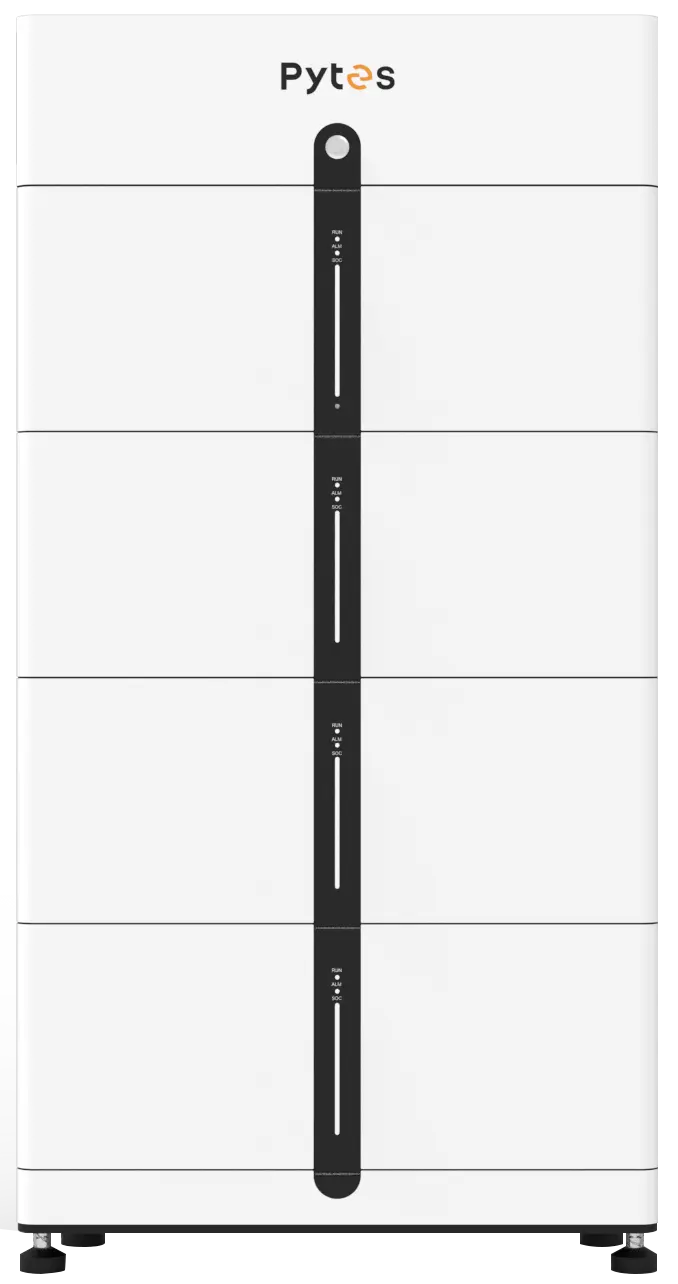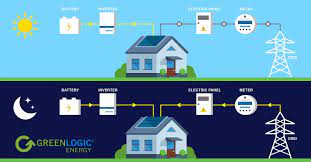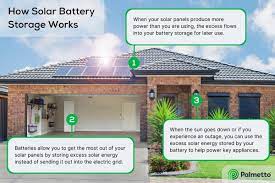As solar energy becomes increasingly popular, homeowners are exploring ways to make the most of their solar panel systems. One option gaining traction is home solar battery storage. By storing excess energy generated by solar panels, homeowners can maximize their energy usage and reduce reliance on the grid. In this article, we will explore the key things to know about home solar battery storage, helping you make an informed decision about integrating this technology into your solar energy system.
How Does Home Battery Storage Work?
The purpose of home solar battery storage is to store energy for later use. The electricity generated by solar panels from the sun is passed via a direct current (DC) into an inverter, allowing it to generate alternating current (AC) electricity, which is the electric current needed to power your home appliances. The electricity not used by your home appliances charges your battery so that when the sun goes down, your appliances are powered by the stored energy in your battery.
What Types of Solar Batteries Are There?
The two most common types of home storage batteries are lithium-ion and lead-acid. But what are the differences between the two?
Lithium-ion batteries
Lithium-ion is typically more expensive than lead-acid, but it’s the most popular option to tie to a solar power system. It has a higher maximum depth of discharge (DoD), which means that more of the percentage of energy stored in the battery can be discharged relative to the overall battery capacity, and it can charge at a much faster rate.
Lead-acid batteries
Lead-acid batteries are more popular in off-grid settings. They have a lower maximum DoD, which shortens their service life.When selecting a battery, you’ll also need to know the system type and configuration you need, because not all batteries are compatible with all systems.
You’ll need to know what batteries your inverter is compatible with, or if the battery has a built-in inverter(such as Pytes E-Box-48100R).
To properly evaluate a battery, you should consider:
Its storage capacity (kWh)
Efficiency
Cost
Inverter and system compatibility
Output power ratings (continuous and peak)
Expected lifespan and warranties
How Much Power Can A Battery Store?
When you refer to battery storage capacity, you're talking about the number of hours the battery can provide power, not continuous output capacity, which describes the maximum instantaneous power level the battery can output (when the panels are in full sunlight ).
If your battery has a capacity of 6kWh, that means it can produce up to 6kW of instantaneous power. However, its storage capacity (measured in kilowatt hours) will be much higher.
Common battery sizes
Common capacities of household batteries are 6kWh, 10kWh and 13kWh. Assuming an electric kettle is turned on for an hour, it will consume about 2 kWh of electricity, while a regular AC unit will consume about 1.5 kWh.
One option for increasing storage capacity is to "stack" multiple batteries. If you may need to increase your storage capacity in the future, be sure to purchase stack-compatible batteries,such as Pytes Stacked Low Voltage Battery- Pytes Pi LV1.
Pytes’Pi LV1 is a stackable lithium iron phosphate (LFP) battery that is versatile and easy to install.

Introduction to Pytes’Pi LV1
1. Stacked low-voltage battery design
The Pi LV1 from Pytes features a harmless LFP battery design and rugged construction, making it a solid choice for home energy storage needs. Each module is equipped with a field-proven battery management system (BMS), integrated DC circuit breaker and fuses to ensure maximum safety and protection for your system.
2. Quick and easy installation
The Pi LV1 is designed with the installer in mind, featuring quick connectors and a plug-and-play design. This eliminates the need for manual wiring and significantly simplifies the installation process. Pi LV1 has a compact footprint, reduced weight, and easy and quick installation. Pytes truly simplifies the installation process, making it easy to use for homeowners and professionals alike.
3. Strong output power and high energy efficiency
When stacked with up to six modules, the Pi LV1 delivers 14.08kW of continuous output and 25.6kW of surge output. This impressive power capacity ensures that your home appliances and critical equipment continue to run smoothly during a power outage. Additionally, the Pi LV1’s modular design allows for flexible configuration based on your energy needs. Capacities range from 10.24 to 30.72 kWh per stack, allowing you to tailor the system to your specific needs. Able to expand the total system capacity to 122.88 kWh, the Pi LV1 provides a versatile and scalable energy storage solution.
How Much Does A Home Battery Cost?
Solar batteries typically cost between $10,000 and $20,000, depending on the battery's functionality, cell type, output and expected lifespan. High-output and long-life batteries are naturally on the higher end of the spectrum in terms of cost, but you should decide based on your household's needs rather than what's cheapest. It makes sense to weigh the purchase price of the battery against the cost of the solar panel system over the two lifetimes of the battery.
Benefits of Home Solar Battery Storage
Energy Independence: By storing excess energy, you can reduce reliance on the grid and have more control over your energy usage. This is particularly beneficial during peak demand periods or when electricity prices are high.
Increased Self-Consumption: Home solar battery storage allows you to maximize self-consumption of the solar energy your panels generate. Instead of exporting excess power back to the grid, you can store it for use later when your energy demand exceeds solar generation. This reduces the need to purchase electricity from the grid, resulting in cost savings.
Backup Power: Having a solar battery provides a reliable backup power source during grid outages. This is especially important for areas prone to power cuts or natural disasters, ensuring that your essential appliances and devices continue to function.
Time-of-Use Optimization: Some areas have time-of-use electricity pricing, where rates vary throughout the day. Solar battery storage enables you to store excess energy generated during off-peak hours and use it during peak hours when electricity prices are higher. This can lead to significant cost savings.

Conclusion
Home solar battery storage offers many benefits, including energy independence, increased self-consumption, backup power, time-of-use optimization and environmental sustainability. By considering factors such as battery capacity, depth of discharge, battery life, compatibility, and financial considerations, you can make an informed decision about integrating this technology into your solar system. Work with experienced Pytes to ensure proper installation and integration to maximize the benefits of home solar battery storage. Employing this technology can help create a greener future while giving you more control over your energy use and reducing your reliance on the grid.
Pytes (USA) ENERGY, INC. focuses on developing innovative solutions for residential energy storage systems. Over the past 10 years, we have developed a wealth of knowledge and expertise in this field, allowing us to provide our customers with the latest and most advanced home battery solutions.
Whether you want to install a new energy storage system or upgrade an existing one, Pytes has the expertise and technology to help you achieve your goals.
Welcome to contact us or browse our website to learn more about our battery products and how they can benefit you.
Website:www.pytesusa.com
Email:pytesusa@pytesgroup.com









